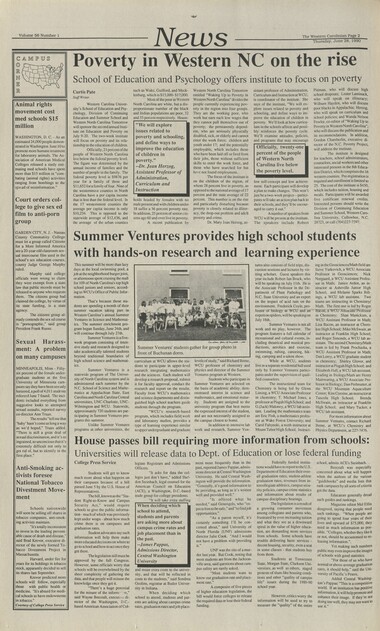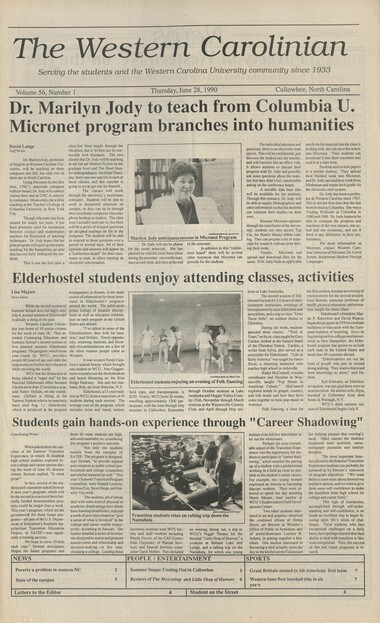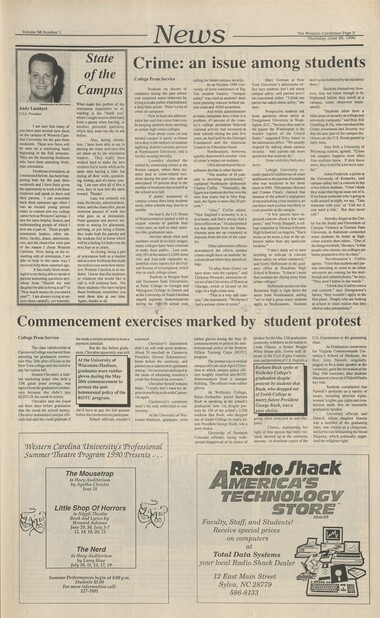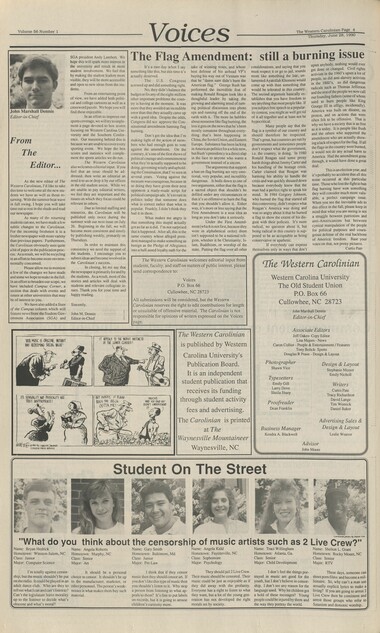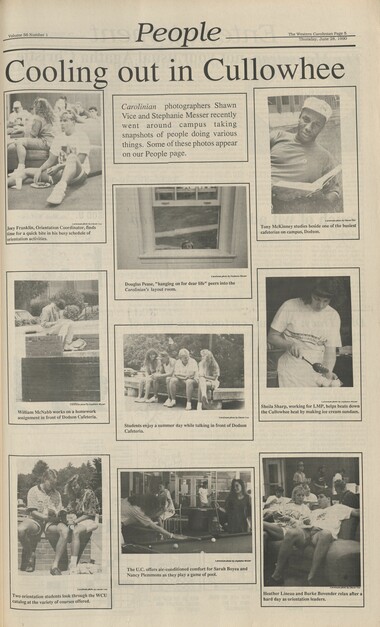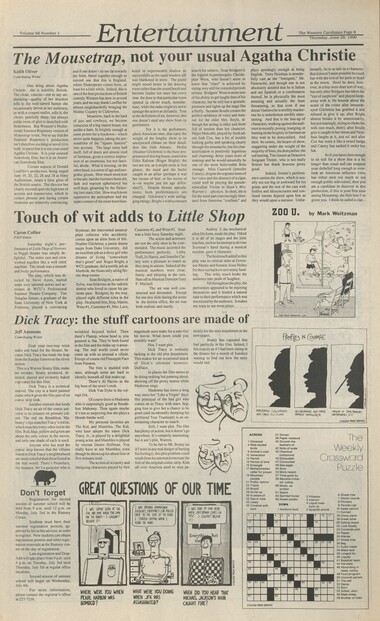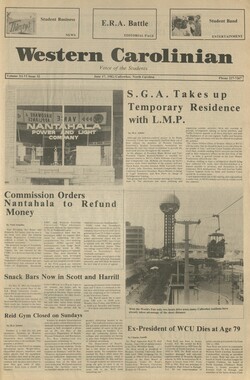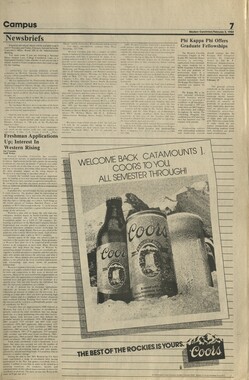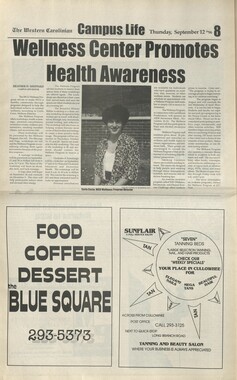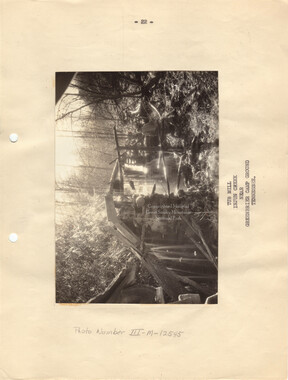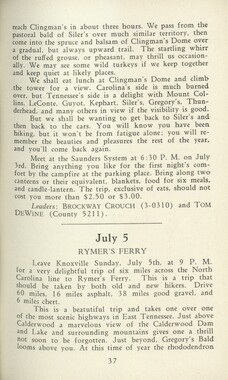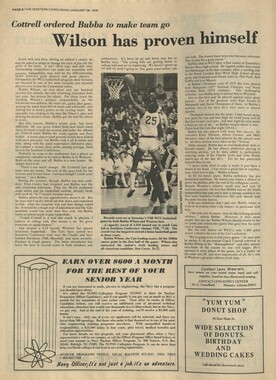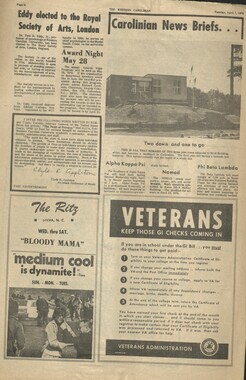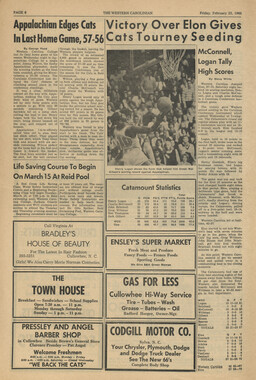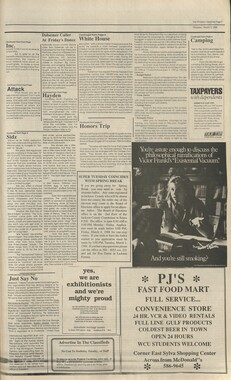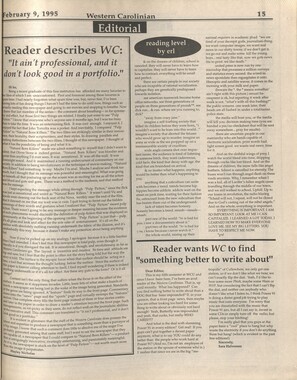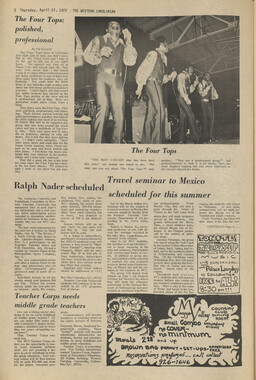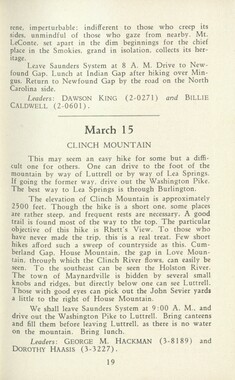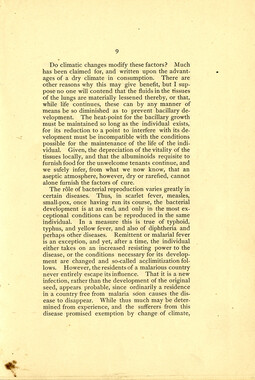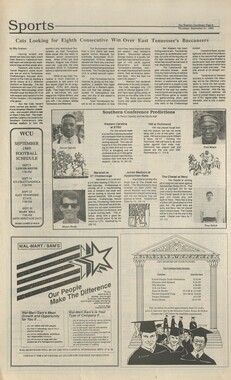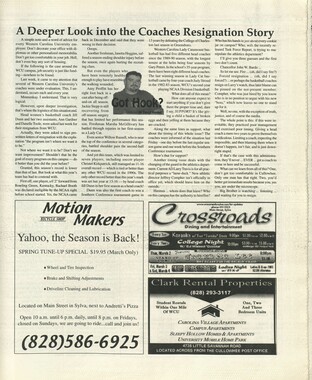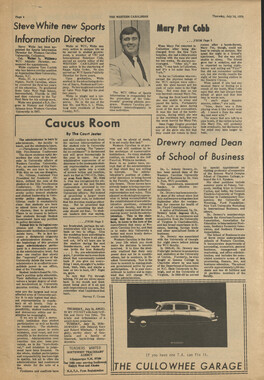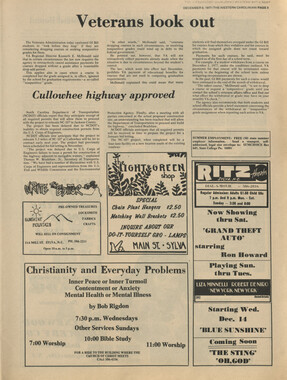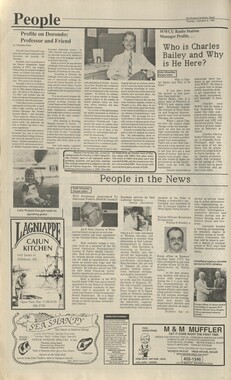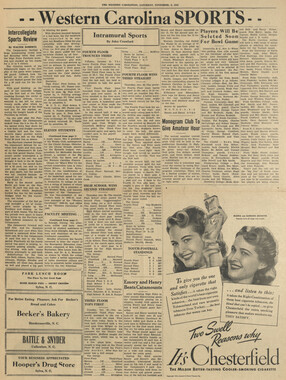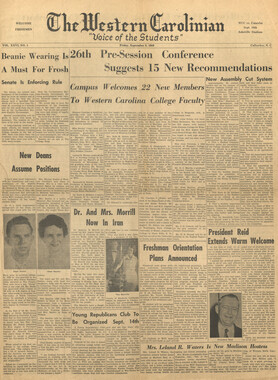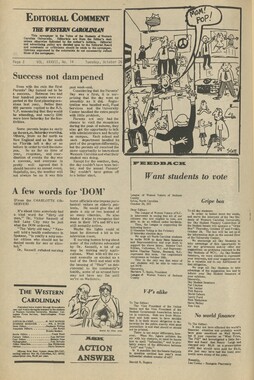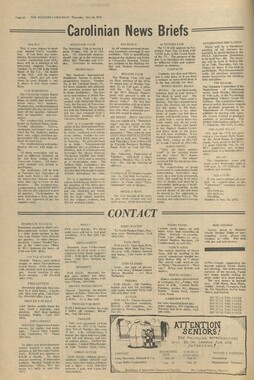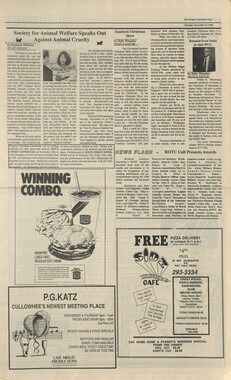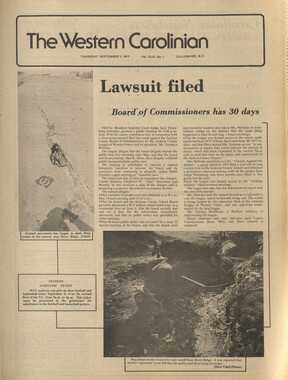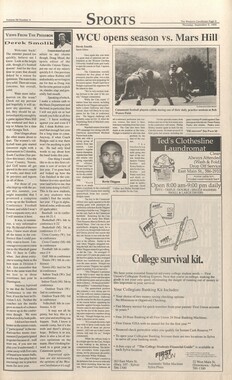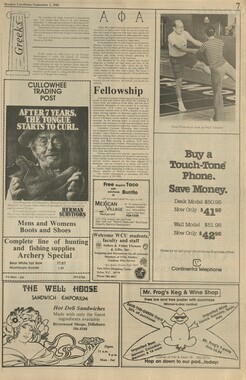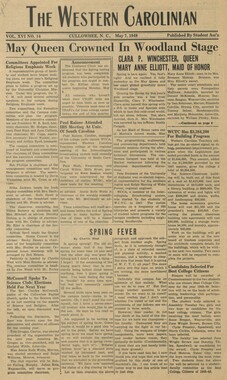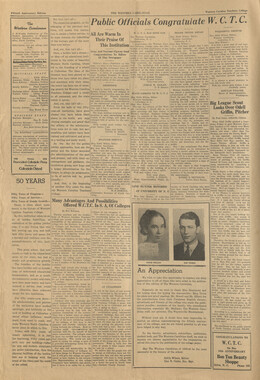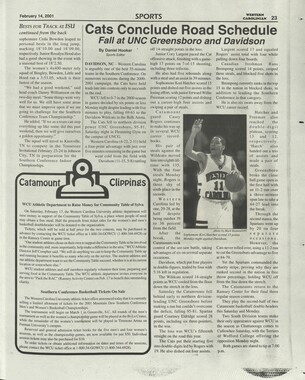Western Carolina University (20)
View all
- Canton Champion Fibre Company (2308)
- Cherokee Traditions (293)
- Civil War in Southern Appalachia (165)
- Craft Revival (1942)
- Great Smoky Mountains - A Park for America (2683)
- Highlights from Western Carolina University (430)
- Horace Kephart (941)
- Journeys Through Jackson (154)
- LGBTQIA+ Archive of Jackson County (15)
- Oral Histories of Western North Carolina (314)
- Picturing Appalachia (6679)
- Stories of Mountain Folk (413)
- Travel Western North Carolina (160)
- Western Carolina University Fine Art Museum Vitreograph Collection (129)
- Western Carolina University Herbarium (92)
- Western Carolina University: Making Memories (708)
- Western Carolina University Publications (2283)
- Western Carolina University Restricted Electronic Theses and Dissertations (146)
- Western North Carolina Regional Maps (71)
- World War II in Southern Appalachia (131)
University of North Carolina Asheville (6)
View all
- Western Carolina College (199)
- Western Carolina Teachers College (239)
- Western Carolina University (1792)
- Allanstand Cottage Industries (0)
- Appalachian National Park Association (0)
- Bennett, Kelly, 1890-1974 (0)
- Berry, Walter (0)
- Brasstown Carvers (0)
- Cain, Doreyl Ammons (0)
- Carver, George Washington, 1864?-1943 (0)
- Cathey, Joseph, 1803-1874 (0)
- Champion Fibre Company (0)
- Champion Paper and Fibre Company (0)
- Cherokee Indian Fair Association (0)
- Cherokee Language Program (0)
- Crittenden, Lorraine (0)
- Crowe, Amanda (0)
- Edmonston, Thomas Benton, 1842-1907 (0)
- Ensley, A. L. (Abraham Lincoln), 1865-1948 (0)
- Fromer, Irving Rhodes, 1913-1994 (0)
- George Butz (BFS 1907) (0)
- Goodrich, Frances Louisa (0)
- Grant, George Alexander, 1891-1964 (0)
- Heard, Marian Gladys (0)
- Kephart, Calvin, 1883-1969 (0)
- Kephart, Horace, 1862-1931 (0)
- Kephart, Laura, 1862-1954 (0)
- Laney, Gideon Thomas, 1889-1976 (0)
- Masa, George, 1881-1933 (0)
- McElhinney, William Julian, 1896-1953 (0)
- Niggli, Josephina, 1910-1983 (0)
- North Carolina Park Commission (0)
- Osborne, Kezia Stradley (0)
- Owens, Samuel Robert, 1918-1995 (0)
- Penland Weavers and Potters (0)
- Rhodes, Judy (0)
- Roberts, Vivienne (0)
- Roth, Albert, 1890-1974 (0)
- Schenck, Carl Alwin, 1868-1955 (0)
- Sherrill's Photography Studio (0)
- Smith, Edward Clark (0)
- Southern Highland Handicraft Guild (0)
- Southern Highlanders, Inc. (0)
- Stalcup, Jesse Bryson (0)
- Stearns, I. K. (0)
- Thompson, James Edward, 1880-1976 (0)
- United States. Indian Arts and Crafts Board (0)
- USFS (0)
- Vance, Zebulon Baird, 1830-1894 (0)
- Weaver, Zebulon, 1872-1948 (0)
- Western Carolina University. Mountain Heritage Center (0)
- Whitman, Walt, 1819-1892 (0)
- Wilburn, Hiram Coleman, 1880-1967 (0)
- Williams, Isadora (0)
- 1920s (57)
- 1930s (69)
- 1940s (114)
- 1950s (66)
- 1960s (314)
- 1970s (599)
- 1980s (406)
- 1990s (379)
- 2000s (195)
- 2010s (83)
- 1600s (0)
- 1700s (0)
- 1800s (0)
- 1810s (0)
- 1820s (0)
- 1830s (0)
- 1840s (0)
- 1850s (0)
- 1860s (0)
- 1870s (0)
- 1880s (0)
- 1890s (0)
- 1900s (0)
- 1910s (0)
- 2020s (0)
- Jackson County (N.C.) (2282)
- Appalachian Region, Southern (0)
- Asheville (N.C.) (0)
- Avery County (N.C.) (0)
- Blount County (Tenn.) (0)
- Buncombe County (N.C.) (0)
- Cherokee County (N.C.) (0)
- Clay County (N.C.) (0)
- Graham County (N.C.) (0)
- Great Smoky Mountains National Park (N.C. and Tenn.) (0)
- Haywood County (N.C.) (0)
- Henderson County (N.C.) (0)
- Knox County (Tenn.) (0)
- Knoxville (Tenn.) (0)
- Lake Santeetlah (N.C.) (0)
- Macon County (N.C.) (0)
- Madison County (N.C.) (0)
- McDowell County (N.C.) (0)
- Mitchell County (N.C.) (0)
- Polk County (N.C.) (0)
- Qualla Boundary (0)
- Rutherford County (N.C.) (0)
- Swain County (N.C.) (0)
- Transylvania County (N.C.) (0)
- Watauga County (N.C.) (0)
- Waynesville (N.C.) (0)
- Yancey County (N.C.) (0)
- Newsletters (510)
- Publications (documents) (1773)
- Aerial Photographs (0)
- Aerial Views (0)
- Albums (books) (0)
- Articles (0)
- Artifacts (object Genre) (0)
- Biography (general Genre) (0)
- Cards (information Artifacts) (0)
- Clippings (information Artifacts) (0)
- Crafts (art Genres) (0)
- Depictions (visual Works) (0)
- Design Drawings (0)
- Drawings (visual Works) (0)
- Envelopes (0)
- Facsimiles (reproductions) (0)
- Fiction (general Genre) (0)
- Financial Records (0)
- Fliers (printed Matter) (0)
- Glass Plate Negatives (0)
- Guidebooks (0)
- Internegatives (0)
- Interviews (0)
- Land Surveys (0)
- Letters (correspondence) (0)
- Manuscripts (documents) (0)
- Maps (documents) (0)
- Memorandums (0)
- Minutes (administrative Records) (0)
- Negatives (photographs) (0)
- Newspapers (0)
- Occupation Currency (0)
- Paintings (visual Works) (0)
- Pen And Ink Drawings (0)
- Periodicals (0)
- Personal Narratives (0)
- Photographs (0)
- Plans (maps) (0)
- Poetry (0)
- Portraits (0)
- Postcards (0)
- Programs (documents) (0)
- Questionnaires (0)
- Scrapbooks (0)
- Sheet Music (0)
- Slides (photographs) (0)
- Sound Recordings (0)
- Specimens (0)
- Speeches (documents) (0)
- Text Messages (0)
- Tintypes (photographs) (0)
- Transcripts (0)
- Video Recordings (physical Artifacts) (0)
- Vitreographs (0)
- The Reporter, Western Carolina University (510)
- WCU Students Newspapers Collection (1744)
- A.L. Ensley Collection (0)
- Appalachian Industrial School Records (0)
- Appalachian National Park Association Records (0)
- Axley-Meroney Collection (0)
- Bayard Wootten Photograph Collection (0)
- Bethel Rural Community Organization Collection (0)
- Blumer Collection (0)
- C.W. Slagle Collection (0)
- Canton Area Historical Museum (0)
- Carlos C. Campbell Collection (0)
- Cataloochee History Project (0)
- Cherokee Studies Collection (0)
- Daisy Dame Photograph Album (0)
- Daniel Boone VI Collection (0)
- Doris Ulmann Photograph Collection (0)
- Elizabeth H. Lasley Collection (0)
- Elizabeth Woolworth Szold Fleharty Collection (0)
- Frank Fry Collection (0)
- George Masa Collection (0)
- Gideon Laney Collection (0)
- Hazel Scarborough Collection (0)
- Hiram C. Wilburn Papers (0)
- Historic Photographs Collection (0)
- Horace Kephart Collection (0)
- Humbard Collection (0)
- Hunter and Weaver Families Collection (0)
- I. D. Blumenthal Collection (0)
- Isadora Williams Collection (0)
- Jesse Bryson Stalcup Collection (0)
- Jim Thompson Collection (0)
- John B. Battle Collection (0)
- John C. Campbell Folk School Records (0)
- John Parris Collection (0)
- Judaculla Rock project (0)
- Kelly Bennett Collection (0)
- Love Family Papers (0)
- Major Wiley Parris Civil War Letters (0)
- Map Collection (0)
- McFee-Misemer Civil War Letters (0)
- Mountain Heritage Center Collection (0)
- Norburn - Robertson - Thomson Families Collection (0)
- Pauline Hood Collection (0)
- Pre-Guild Collection (0)
- Qualla Arts and Crafts Mutual Collection (0)
- R.A. Romanes Collection (0)
- Rosser H. Taylor Collection (0)
- Samuel Robert Owens Collection (0)
- Sara Madison Collection (0)
- Sherrill Studio Photo Collection (0)
- Smoky Mountains Hiking Club Collection (0)
- Stories of Mountain Folk - Radio Programs (0)
- Venoy and Elizabeth Reed Collection (0)
- WCU Gender and Sexuality Oral History Project (0)
- WCU Mountain Heritage Center Oral Histories (0)
- WCU Oral History Collection - Mountain People, Mountain Lives (0)
- Western North Carolina Tomorrow Black Oral History Project (0)
- William Williams Stringfield Collection (0)
- Zebulon Weaver Collection (0)
- College student newspapers and periodicals (1769)
- African Americans (0)
- Appalachian Trail (0)
- Artisans (0)
- Cherokee art (0)
- Cherokee artists -- North Carolina (0)
- Cherokee language (0)
- Cherokee pottery (0)
- Cherokee women (0)
- Church buildings (0)
- Civilian Conservation Corps (U.S.) (0)
- Dams (0)
- Dance (0)
- Education (0)
- Floods (0)
- Folk music (0)
- Forced removal, 1813-1903 (0)
- Forest conservation (0)
- Forests and forestry (0)
- Gender nonconformity (0)
- Great Smoky Mountains National Park (N.C. and Tenn.) (0)
- Hunting (0)
- Landscape photography (0)
- Logging (0)
- Maps (0)
- Mines and mineral resources (0)
- North Carolina -- Maps (0)
- Paper industry (0)
- Postcards (0)
- Pottery (0)
- Railroad trains (0)
- Rural electrification -- North Carolina, Western (0)
- School integration -- Southern States (0)
- Segregation -- North Carolina, Western (0)
- Slavery (0)
- Sports (0)
- Storytelling (0)
- Waterfalls -- Great Smoky Mountains (N.C. and Tenn.) (0)
- Weaving -- Appalachian Region, Southern (0)
- Wood-carving -- Appalachian Region, Southern (0)
- World War, 1939-1945 (0)
- Text (2283)
- MovingImage (0)
- Sound (0)
- StillImage (0)
Western Carolinian Volume 56 Number 01
Item
Item’s are ‘child’ level descriptions to ‘parent’ objects, (e.g. one page of a whole book).
-
-
Volume 56 Number 1 News The Western Carolinian Page 2 Thursday, June 28, 1990 Animal rights movement cost med schools $15 million WASHINGTON, D. C. - As an estimated 24,000 people demonstrated in Washington June 10 to promote more humane treatment for laboratory animals. The Association of American Medical Colleges released a study estimating med schools have spent more than $15 million in "combating (animal rights) activities ranging from bombings to the spread of misinformation." Court orders college to give sex ed film to anti-porn group GARDEN CITY, N. J. - Nassau County Community College must let a group called Citizens for a More Informed America see a 20-year-old classroom sexual intercourse film used in the school's sex education courses, county Judge George Murphy ruled. Murphy said college officials were wrong to claim they were exempt from a state law that public records must be released to anyone who requests them. The citizens group had claimed the college, by virtue of its state funding, is a state agency. The citizens group already contends the sex ed course is "pornographic," said group President Frank Russo. Sexual Harassment: A problem on many campuses MINNEAPOLIS, Minn - Fifty- six percent of the female undergraduate students at the five University of Minnesota campuses say they have been sexualy harassed, a poll of 4,011 students released June 7 found. The incidents included everything from suggestive looks to attempted sexual assaults, reported survey co-director Ann Truax. The results "tell me that 'baby' hasn't come as long a way as we'd hoped," Truax added. "There is still a great deal of sexual discrimination, and it's so ingrained, so unconcious that it's extremely difficult not only to get rid of, but to identify in the first place." Anti-Smoking activists foresee National Tobacco Divestment Movement Schools nationwide will soon be selling off shares in tobacco companies, anti-smoking activists maintain. "It's totally inconsistent to invest in the leading preventable cause of death and disease," said Brad Krevor, executive director of the newly formed Tobacco Divestment Project in Massachusetts. Harvard, under fire for years for its holdings in tobacco stock, apparantly decided to sell its shares last September. Krevor predicted more schools will follow, especially those with public health or medicine. "It's absurd for medical schools to have endowments in tobacco." Courtesy of College Press Service Poverty in Western NC on the rise School of Education and Psychology offers institute to focus on poverty Curtis Pate Staff Writer Western Carolina University's School of Education and Psychology, Division of Continuing Education and Summer School and Western North Carolina Tomorrow will sponsor the second annual Institute on Education and Poverty on July 9-20. The two-week institute will focus on poverty and its relationship to the education of children. Officially,21 perccntofthe people of Western North Carolina live below the federal poverty level. The figure was determined by the annual income of families and the number of people in the family. The federal poverty level is $9876 per year for a family of three and $11,652 fora family of four. Nine of the westernmost counties in North Carolina have a per capita income that is less than the federal level. In the 17 westernmost counties the average per capita income is only $10,234. This is opposed to the statewide average of $12,436, and the average of the urban counties such as Wake, Guilford, and Mecklenburg, which is $15,000- $17,000. Most of the poor in Western North Carolina are white, but a disproportionate number of the black and Indian populations are poor, 32 and 33 percent respectively. House- "We will explore issues related to poverty and schooling, and define ways to improve the education of children in poverty." —Dr. Jean Herzog, Assistant Professor of Administration, Curriculum and Instruction holds headed by females with no male present and with children under 18 suffer a 36 percent poverty rate. In addition, 25 percent of senior citizens age 60 and over live in poverty. A recent publication by Western North Carolina Tomorrow entitled "Waking Up to Poverty in Western North Carolina" divides the people currently experiencing poverty in the region into four groups. They are the working poor, who work but earn such low wages that they cannot pull themselves out of poverty; the permanently dependent, who are seriously physically disabled, sick, or elderly and cannot enter the work force; children and youth under 17; and the potentially employable, which includes those who have been laid off or fired from their jobs, those without sufficient skills to enter the work force, and those who have searched for but have not found employment. The focus of the institute is on the children of the region, of whom 28 percent live in poverty, as opposed to the national average of 17 percent and the state average of 22 percent. This number is on the rise and particularly disturbing because poverty is closely related to illiteracy, the drop-out problem and adult poverty and crime. Dr. Mary Jean Herzog, as sistant professor of Administration, Curriculum and Instruction at WCU, is coordinator of the institute. She says of the institute, "We will explore issues related to poverty and schooling, and define ways to improve the education of children in poverty. We'll look at how curriculum in the schools affects and possibly reinforces the poverty cycle. We'll examine attitudes, policies, and programs that may encourage Officially, twenty-one percent of the people of Western North Carolina live below the poverty level. low self-concept and low achievement. Each participant will develop a plan to make changes. This won't just be a two-week project—participants will take an action plan back to their schools, and they'll be encouraged to carry it out." A number of speakers from WCU will be present at the institute. The speakers include Robert Pittman, who will discuss high school dropouts; Lester Laminack, who will speak on illiteracy; Wilburn Hayden, who will discuss poor blacks in Appalachia; Herzog, who will speak on curriculum and school policies; and Wanda Nelson Fowler, co-editor of "Waking Up to Poverty in Western North Carolina", who will discuss the publication and its recommendations. In addition, Gordon Chambcrlin, executive director of the N.C. Poverty Project, will address the institute. The institute is designed for teachers, school administrators, counselors, social workers and other interested persons in the 8th Education District, which comprises the 16 western counties. Pre-registration is required and enrollment is limited to 25. The cost of the institute is $450, which includes tuition, housing and meals. Participants will be awarded five certificate renewal credits. Interested persons should write the Division of Continuing Education and Summer School, Western Carolina University, Cullowhee, N.C. 28723, or call (704)227-7397. Summer Ventures provides high school students with hands-on research and learning experience This summer will be more than lazy days at the local swimming pool, a job at the neighborhood burger joint, or afternoons spent cruising the mall for 109 of North Carolina's top high school juniors and seniors, according to WCU's Office of Public Information. That's because those students are spending a month of their summer vacation taking part in Western Carolina's annual Summer Ventures in Science and Mathematics. The summer enrichment program began Sunday, June 24th, and will continue through July 27th. Summer Ventures is a five- week program consisting of intensive study and research designed to take academically talented students beyond traditional boundaries of high school science and mathematics. Summer Ventures is a statewide program of The University of North Carolina system and is administered each summer by the N.C. School of Science and Mathematics at Appalachian State, East Carolina and North Carolina Central universities, UNC-Charlotte, UNC- Wilmington and WCU. Statewide, approximately 720 students arc participating in Summer Ventures programs this summer. Unlike Summer Ventures programs at other universities, the »i#f<f«| Ctfotinu*.. phou* ay Su-^ianie ... Summer Ventures' students gather for group photo in front of Buchanan dorm. curriculum at WCU allows the students to participate in upper-level research integrating mathematics and the sciences. Each student will develop a research proposal, submit it for faculty approval, conduct the research and report on the results. Faculty from WCU's mathematics and science departments and distinguished high school teachers guide students through the program. "WCU's research-based program, which includes field work and laboratory studies, provides a type of learning experience similar to upper undergraduate and graduate levels of study," said Richard Berne, WCU professor of chemistry and physics and director of the Summer Ventures program at Western. Students who participate in Summer Ventures are selected on the basis of academic ability, demonstrated interest in science and mathematics, and emotional maturity. Students are assigned to the university program that best meets the expressed interest of the student, and are not necessarily assigned to the campus closest to home. In addition to intensive lab work and research, Summer Ven tures also consists of field trips, discussion sessions and lectures by visiting scholars. Guest speakers this year include Robert Ian Bruck, who will be speaking on July 11th. He is the Associate Professor in the Department of Plant Pathology and N.C. State University and an expert on the impact of acid rain on the environment. Frederick Coyle, professor of biology at WCU and an expert on spiders, will be speaking on July 18th. Summer Ventures is not all work and no play, however. The program features a full calendar of recreational and cultural events, including theatrical and musical productions, aerobics and exercise, swimming, rafting, canoeing, hiking, camping and a talent show. While at WCU, students live in a separate residential hall used only by Sjmmcr Ventures participants under the supervision of qualified counselors. The instructional team for Chemistry is being led by Glenn Liming, a WCU Associate Professor in chemistry; T. Michael Jones, a professor at Pisgah High School; and G.(Jack) Maloney, a WCU lab assistant. Leading the mathematics team are Eric Fink, a mathematics professor at Wake Forest University; and Carol Faltynski, a math instructor at Mount Tabor High School. Instruct ing in the Geosciences/Math field are Steve Yurkovich, a WCU Associate Professor in Geosciences; Nick Norgaard, a WCU Assistant Professor in Math; Janice Arden, an instructor at Asheville Junior High School; and Melanie Sparks Billings, a WCU lab assistant. Two teams are instructing in Chemistry/ Math. The first one is led by Roger Bacon, a WCU Associate Professor in Chemistry; Shan Manickam, a WCU Assistant Professor in Math; Lisa Bacon, an instructor at Cherokee High School; Mike McSwain, an instructor at Franklin High School; and Roger Simonds, a WCU lab assistant. The second Chemistry/Math team is led by Frank Prochaska, a WCU Assistant Professor in Math; Dan Lorey, a WCU graduate student in chemistry; Shirley Glover, and instructorat Pisgah High School; and Elizabeth Hall, a WCU lab assistant. Leading in Biology/Math are Henry Mainwaring, a WCU Associate Professor in Biology; Dan Perlmutter, at the WCU Mountain Aquaculture Center; Kim Corzine, an instructorat Tuscola High School; Brenda McSwain, an instructor at Franklin High School; and Mary Tucker, a WCU lab assistant. For more information about Summer Ventures, contact Richard Berne, at WCU's Chemistry and Physics Department, at 227-7476. House passes bill requiring more information from schools: Universities will release data to Dept. of Education or lose federal funding College Press Service Students will get to know much more about what happens on their campuses because of a bill passed June 5 by the U.S. House of Representatives. Thcbill,known as the "Student Right-to-Know and Campus Security Act," would require schools to give the public information - much of which was previously kept under wraps - about how much crime there is on campuses and graduation rates. Student advocates say such information will help them make more educated decisions on whereto go to school and how to act once they get there. The legislation still must be approved by the full Congress. However, some officials worry that schools will be overwhelmed by the sheer complexity of gathering the data, and that people will misuse the knowledge once they get it. "There's a huge potential for the misuse of the inform >n," said Wayne Beecraft, executive director of the Washington, D.C.- based American Association of Col legiate Registrars and Admissions Officers. "It asks for data the colleges just don't have," added Sheldon Stcinbach, legal counsel for the American Council on Education (ACE), a Washington, D.C.-based trade group for college presidents. "It will take extra staffing When deciding which school to attend, students and parents are asking more about campus crime rates and job placement than in the past. —James Pappas, Admissions Director, Central Washington University and mean extra costs to the university, and that will be reflected in costs to the students," said Sondrea Ozolins, registrar at Butler University in Indiana. When deciding which school to attend, students and parents are asking about campus crime rates, graduation rates and job place ment more frequently than in the past, reported James Pappas, admissions director at Central Washington University. He said Central Washington will provide the information. "Generally, it's good information to be providing, as long as it's written well and provided well." "It offered what he needed," said Gencngcls, who "expects him to be safe," and "to find job opportunities." "As a parent myself, it's certainly something I'll be concerned about," said University of North Florida (UNF) admissions director Julie Cook. "And I would not have a problem with providing it." UNF was the site of a murder last year. But Cook, noting that most students are from the Jacksonville area, said questions about campus safety are rarely asked. "Most students want to know our graduation rate and placement rate." A composite of five pieces of higher education legislation, the bill would force colleges to release the required data or lose their federal funding. Federally funded institutions would have to report to the U.S. Department of Education their overall graduation rates, student-athlete graduation rates, revenues from intercollegiate athletics, campus security policies, campus crime statistics and information about results of campus disciplinary hearings. The legislation is a result of a growing consumer movement among collegians and parents who, frustrated by ever-increasing tuition and what they see as a downward spiral in the value of higher education, are demanding more services from schools. Some schools have trouble delivering basic services - decent housing, security, even a seat in some classes - that students buy from them. Students at Tennessee State, Morgan State, Clarkson Universities, as well as others, staged protests of slum-like housing conditions and other "quality of campus life" issues during the 1989-90 school year. However, critics worry the information will be used to try to measure the "quality" of the entire school, admits ACE's Steinbach. . Beecraft was especially concerned about what will happen when the authors of the various "guidebooks" and media lists that rank campuses by all sorts of criteria get the data. Educators generally dread such guides and rankings. Magazine editor Mel Elfin disagreed, saying that people need such rankings. "When people are going to spend four years of their lives and upward of $75,000, they need as much information as possible. "Colleges, whether they like it or not, should be accustomed to releasing information.". Yet making such numbers public may even improve the images of schools with good statistics. "For those of us who have normal or above-average graduation rates, it should help," said the University of Pacific's Peters. Added Central Washington's Pappas: "This is a competitive world. If an institution has positive information, it will help promote and enhance their image. If they're not doing too well, they may not want to use it."
Object
Object’s are ‘parent’ level descriptions to ‘children’ items, (e.g. a book with pages).
-
The Western Carolinian is Western Carolina University's student-run newspaper. The paper was published as the Cullowhee Yodel from 1924 to 1931 before changing its name to The Western Carolinian in 1933.
-
